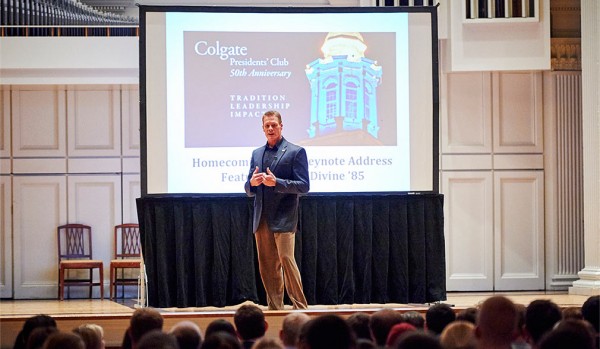Turn more hardscapes green
William Meyer’s excellent article “Urban Legends” (autumn 2014) reminded me that I am an environmentalist for the sake of convenience. I do not own a car, I walk to work, and I use public transportation when I need to go beyond my neighborhood. My wife and I live in a historically certified row house, grow vegetables in a community garden, have access to good medical care, and enjoy many amenities of urban life in Philadelphia.
As a botanist, however, I have a more legitimate claim as an environmentalist. Much of my work has involved issues with the Clean Water Act, the Endangered Species Act, and preserving biodiversity. Considering urban living from this viewpoint, I see that much more needs to be done to alleviate the negative environmental impacts of the urban gridiron. More hardscapes need to turn green.
Alfred E. (Ernie) Schuyler ’57
Curator Emeritus of Botany, Academy of Natural Sciences, Drexel University
Kudos
Although I graduated from Colgate, I have never been overly interested in the Colgate Scene. Nevertheless, you have faithfully mailed me copies year after year (Thanks). And, year after year, I merely glanced at it. But now, I must reveal, I read it carefully. Not because of Colgate-love, but because it is such a lovely professionally produced magazine.
Daniel A. Michelson ’51
Mondorf-les-Bains, Luxembourg
On pressure and unconditional love
Kathryn Van Scoter’s fine essay “My God. My Enemy. My Eating Disorder.” (Tableau, autumn 2014) provides a poignant portrait of her courageous battles with the tremendous pressures of food, image, and expectations. I was truly saddened to read that her childhood church increased her burdens by erroneously implying that “only thin, beautiful people are acceptable in the eyes of their God.” I was equally troubled that she was “raised with the understanding that I must better the world in order to enter the pearly gates of heaven.”
Given the difficulties she faced, I wish she had been exposed to the biblically orthodox message of God’s unconditional love. For example, St. Paul noted, “God saved you by his grace when you believed. And you can’t take credit for this; it is a gift from God. Salvation is not a reward for the good things we have done, so none of us can boast about it” (Ephesians 2:8-9, New Living Translation). In other words, the Bible teaches that a current relationship with God and future access to heaven are both free gifts. As the late Brennan Manning said, “God loves us as we are, not as we should be, because none of us are as we should be.”
Jeff Bjorck ’83
Pasadena, Calif.
On campus protests
I was disappointed, nay, appalled, at a couple of items reported in the autumn 2014 Scene.
The first is a picture on pg. 6 of students holding up the sign “Hands Up, Don’t Shoot” regarding the Ferguson, Mo., issue. Is this what Colgate has come to, making judgments before all of the facts are known and then celebrating it in the Scene?
The second is the intense focus on diversity. It seems to me that the best thing President Herbst could do for the university is to focus on unity. Doesn’t the motto on the Seal of the United States say E Pluribis Unum (Out of Many, One)? We should celebrate the fact that we are Americans. One could emigrate to Germany, but could not become a German, or to Japan, but not become Japanese. But one can come legally to America from anywhere in the world and become an American because the term is not a nationality, but an ideal.
Colgate students should be reminded daily that this is a unique country with liberties, freedoms, and opportunities not afforded anywhere else. What I see is professorial focus on the weakness they perceive in America instead of its great strengths. I have no problem in celebrating one’s cultural heritage and to be able to do so without being slurred, but when the focus exceeds that of our country’s unity, then the university has not done a proper job of educating tomorrow’s leaders.
Col. Philip Chaffee ’55, USAF (Ret.)
Corry, Pa.
As I read the morning papers, I am struck by the degree of injustice, intolerance, violence, and death in the world. The radical Islamic group ISIS has executed Western journalists, Christians, and other Muslims as part of their genocidal rampage through Iraq and Syria. Iran is close to finalizing a nuclear warhead, which will further their stated ambition of wiping Israel from the map. Throughout much of the world, malnutrition, hunger, and disease continue to exact a frightful toll on our fellow humans.
With these events constituting real injustice in the world, it is difficult for me to empathize with a privileged Colgate student occupying a building or holding a protest sign. And it is puzzling that the administration continues to pander to this shrill, vocal, and self-righteous minority. When students leave the protected enclave of Hamilton, they will be forced to confront true injustices, large and small. The faculty and administration would do well to put this all into context for them.
Jeff Swanson ’90
Portland, Ore.
I don’t recall feeling prouder of being a Colgate alum than I did after reading President Herbst’s message on the September student sit-in for diversity and inclusion (autumn 2014). One can argue that it has taken Colgate too long to deal with these issues, but President Herbst’s handling of them is exactly right, in my view.
A university, especially a liberal arts one, must continuously move forward and change. Colgate is by no means alone in having to address issues of prejudice, sexual harassment, and bullying — these same issues arise where I work in the federal government. I applaud the students for their peaceful and, it seems, constructive protest. And kudos to the administration for its openness and honesty.
John P. Williams ’83
Arlington, Va.
Warrior spirit

Homecoming keynote speaker Mark Divine ’85, retired Navy SEAL, author, and founder of SEALFit, talked about “The Unbeatable Mind: Forging Mental Toughness.”
I just finished reading about Navy SEAL Mark Divine ’85 (“Soldier of Fitness,” autumn 2014). I used to row with Mark on the crew [team]. We were just a club sport, but many of us were experienced rowers and in decent shape. Mark, however, took fitness to another level, even back then.
We would sometimes jog around campus as a team, and he was always at the head of the pack. Usually, he would continue running when practice was finished. I can still picture him sprinting up and down the bleacher steps at Andy Kerr Stadium. I didn’t know at the time what motivated him to train like that, but after reading about his accomplishments in the SEALs, and learning about his “warrior spirit,” I understand just a bit more about his self-motivation. I would like to meet Mark again one day, shake his hand, thank him for his service, and laugh about some time spent on the water in our old wooden rowing shells. I look forward to reading his books as well. Thanks for an informative article about an inspirational guy.
David Badami ’88
Skaneateles, N.Y.
Remembering Bruce Berlind
(1926–2014)
I still remember the anticipation with which the small group of English majors in the fall of 1954 greeted Bruce Berlind’s arrival as the new man in the English department of Lawson, Speirs, Kistler, Hoben, and Daniels. Five of us registered for Bruce’s first advanced course, Nineteenth-Century English Prose, offered in the spring of 1955. That was the beginning of a lifetime of mentoring and friendship for which I have more than once thanked my lucky stars.
Although I did not know about Bruce Berlind the poet and translator until after my graduation, it was through our involvement in those arts that we mutually nourished our relationship for decades to come. Although his mere seniority of eight years, as I look back at it now, steadily diminished and disappeared with time, I never stopped wanting to share my work with him and valuing his directly expressed opinion of it. How could I ever forget a letter from him in the late 1990s that began, “Dear George — Your new book of poems is a knockout!”
Finally, precious as our personal memories may be, we should reflect gratefully on the greater significance for all who share in the legacy of Colgate’s history of the advent and tenuring of Bruce Berlind to its faculty. Little did we know in 1954 that the new man in Lawrence Hall would signal and help transform his discipline and university into the institutions we recognize today.
George Economou ’56
Philadelphia, Pa.
One of a kind
Yes, I despair. For the future of civilization. Of the English language. And most important, for my beloved alma mater. What causes this existential angst? This headline in the autumn edition of the Scene Work and Play: “What’s the most unique experience you’ve had at Colgate?” Unique means one of a kind. Uniqueness has no degrees. One thing is not more unique than another. Something is either unique, or it is not. I had expected a higher degree of literacy than this from the official organ of Colgate. Alas, life is cruel.
David Wohl ’74
Tucson, Ariz.
A letter of thanks
I feel moved to write a note of thanks inspired by my father, Jackson King ’52, who died on July 21, 2014.
Dad loved Colgate, and he made sure his family did, too. Trips to football games were highlights of my youth, and growing up outside New Haven, nothing was more fun than the Yale/Colgate game when Mom and Dad would host a post-game “Tunk” that went all night. No surprise that two of us, I and my oldest sister, Susan King Shaw ’81, also went to Colgate.
Dear admission office, Thank you for accepting a scholar-athlete from a working-class family who would not have been able to afford college if not for a War Memorial Scholarship.
Dear athletics office, Thank you for making him a part of the varsity football team. His punting still earns a mention in the Colgate archives, but more importantly, the camaraderie of his teammates and his pride in being a Raider provided him with some of the happiest memories of his life.
Dear Phi Gamma Delta, We didn’t hear many details. Apparently what happened at Fiji, stayed at Fiji. All we know is, Dad had an awful lot of fun.
Dear alumni office, Dad took great pleasure in reunions, Presidents’ Club dinners, editing the class column, and receiving a Maroon Citation.
In his final year, Alzheimer’s robbed him of his strength, his memory, and his voice. But I could always talk about Colgate — about the latest football scores or how much fun my kids had at reunion. Just the mention of the word Colgate would often elicit a reaction; a light in his eyes or a smile.
Alison King Haley ’84
Jamaica Plain, Mass.
Letters of note
I have always thought of Colgate as a special place filled with special people. One of those is my classmate Richard J. Johnson, who has written the 1964 column in the Colgate Scene since our graduation. His writing is vivid, colorful, informative, enjoyable, and exciting to read. We have just celebrated our 50th Reunion, and Dick did another incredible job of writing in the autumn 2014 issue. His reporting and description of the reunion captures the wisdom, spirit, friendship, and loyalty of not only our classmates, but also the entire university.
Thank you again, Dick, for sharing your wit and writing expertise with all of us, and for another wonderful job! We are truly blessed to have you as a member of our class.
Mike Foley ’64
Hovland, Minn.







